China Society
China Trend Watch Top 10: Putin & Kim Jong-un in Beijing, Meituan’s Upcoming Changes, Lu Xun’s Mural Controversy
From Kim Jong-un in Beijing to Lu Xun’s cigarette: what China’s talking about this week – a top 10 by What’s on Weibo.
Published
3 months agoon
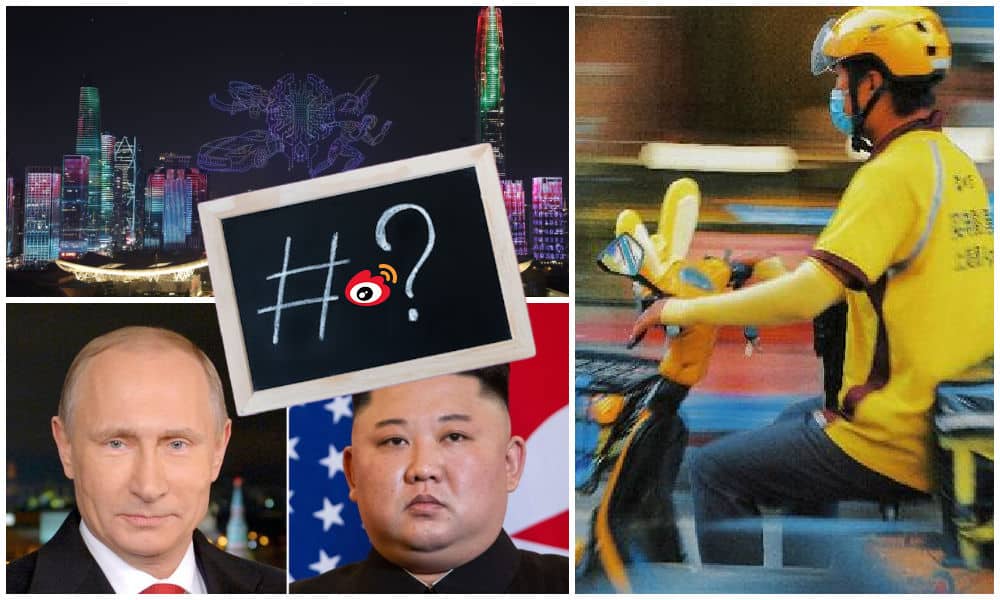
🔥What’s on Weibo’s Top 10: What’s Trending in China This Week (Week 35, 2025) Stay updated with China Trend Watch by What’s on Weibo — your quick overview of what’s trending on Weibo and across other Chinese social media. Trending topics curated by me, with help from my customized What’s on Weibo AI sidekick.
1. Putin and Kim Jong-un to Attend China’s WWII Victory Commemoration
These days, the upcoming September 3rd military parade is trending virtually every day on Chinese social media. On August 28, it was announced that Russian President Vladimir Putin and North Korean leader Kim Jong-un are both among 26 foreign heads of state and government leaders expected to attend China’s commemorative event marking the 80th anniversary of victory in the Second Sino-Japanese War and World War II. Leaders from countries including Cambodia, Vietnam, Iran, and Cuba are on the guest list, underscoring China’s global alliances amid tense geopolitical climates.
Manya’s Take: That Putin would attend the upcoming major parade is no surprise, but the presence of Kim Jong-un is more noteworthy—especially alongside other confirmed attendees, including leaders from Indonesia, Pakistan, Nepal, Iran, Myanmar, Malaysia, Vietnam, and others. At the same time, there is a clear absence of leaders from Western countries. According to state-linked Weibo commentator “Zhu Tianxia” (@煮天下), there is strong historical justification for Kim’s attendance. Yet he also emphasized that Trump’s absence is a loss for Washington, given Trump’s repeated statements that he wished to meet Kim, while US–Russia diplomatic efforts to end the war in Ukraine have so far yielded little progress. This makes the gathering of Xi, Putin, and Kim Jong-un in the heart of Beijing not just a commemorative event but a symbolic ‘win’ for China, underscoring its ever-growing and shifting role on the global stage.
2. ‘Not the Zong Fuli Era’: Zong Fuli on Wahaha Leadership After Zong Qinghou
On the first anniversary of her appointment as chairwoman of the Chinese food & beverage producer Wahaha Group (娃哈哈集团), Zong Fuli (宗馥莉, also known as Kelly Zong) gave an exclusive interview to Caijing (财经) magazine where she addressed succession, leadership challenges, and public controversies. Responding to the label of the Wahaha Group being in its “Zong Fuli Era” (宗馥莉时代), she dismissed the notion, emphasizing that a company belongs to “everyone who works hard within it,” not just a single individual. In the interview, Zong also spoke more about her views on running Wahaha, advocating long-term strategic growth over short-term results, and sharing her determination to not let controversy distract her from business operations.

Manya’s Take:
Zong Fuli has big shoes to fill. Her father, Wahaha founder and chairman Zong Qinghou (宗庆后), was one of China’s most beloved and respected businessmen. Since his passing in March 2024, Zong has also faced one controversy after another — from outsourcing some of Wahaha’s production to a cheaper water brand, to a high-profile family inheritance dispute involving three alleged illegitimate children living in the US. These issues have dented the company’s brand image. Her latest interview is therefore a timely one, in which Zong demonstrates resilience and determination to keep this much-loved Chinese brand thriving. Especially the fact that she’s staying humble (not wanting this to be he ‘Zong Fuli era’, is something many consumers are likely to appreciate, as humbleness was one of the reasons why people loved Zong Qinghou so much. Is it enough to undo the harm done to Wahaha’s brand image? Perhaps not, but it’s certainly a step in the right direction.
3. Meituan To Scrap Late-Delivery Fines By End-2025
An internal briefing from Chinese food delivery company Meituan (美团) said the platform will eliminate “overtime” penalties for delivery riders by the end of 2025. The company also highlighted “rider-friendly communities” (骑手友好社区) to ease entry to residential compounds via data-linked QR access; 24,700+ communities across 150 cities have reportedly been upgraded. The move follows long-running public concern over rider safety and algorithmic pressures. Many users welcomed the change while asking how timeliness metrics and customer expectations will be managed without fines.
Manya’s Take: In recent years, there has been more attention to the hardships faced by Chinese food delivery workers. Not only do they face many hard or unsafe circumstances while doing their job—from hot weather and thunderstorms to roads or communities that are difficult to enter—but their daily work is also monitored by algorithmic management tools that put extreme pressure on them to deliver their orders on time. Riders can get caught in “algorithm traps” (算法陷阱) because the faster they work, the stricter the algorithm tightens delivery windows, and they may face penalties or reduced earnings if they fail to meet the expected times. Although the cancellation of the late fees is good for drivers, many consumers are skeptical, arguing that their Meituan deliveries are already taking a lot of time—with late fees being canceled, people fear it will only take longer. With Meituan now facing fierce competition from others, including JD and Eleme, the new measure might end up working against Meituan in the food delivery war.
ALSO TRENDING & NOTEWORTHY:
4. Man Wearing Horror Mask on Highway Sparks Public Outrage
A video went viral on Weibo these days showing a man wearing a horror mask on the Changshen Expressway (长深高速), allegedly scaring nearby vehicles. The incident occurred on August 24 and was captured by another driver who claimed the masked man was intentionally frightening passengers. After an investigation, Hangzhou traffic police identified the individual as Hugo, a 42-year-old foreign teacher in Hangzhou, who was a passenger and claimed the mask was a spontaneous joke while retrieving snacks in the car. Police determined the act did not constitute a criminal offense but noted it could affect road safety. Although the incident triggered some online debates over road behavior and safety, many netizens also commented that the fuss was exaggerated given the lack of malicious intent or actual danger caused. But we do wonder if Hugo got into trouble at school 😂

The masked man that triggered controversy.
5. Shenzhen’s 12,000-Drone Light Show for 45th Anniversary
On August 26, Shenzhen celebrated the 45th anniversary of its Special Economic Zone with a record-breaking drone light show featuring 12,000 drones in a dual-venue performance at Renmin Square (市民广场) and Talent Park (人才公园). The show incorporated interactivity with the city lights and featured global artistic collaborations to tell a symbolic story about the history and transformation of the Special Economic Zone. The show drew tens of thousands residents and visitors from outside of Shenzhen, with some queuing five hours in advance. You can watch the full show here.
6. Xi Jinping Meets Cambodian Royalty Ahead of Anniversary
President Xi Jinping and First Lady Peng Liyuan met with Cambodian King Norodom Sihamoni and Queen Mother Monineath at Zhongnanhai on August 26. Xi invited King Sihamoni to attend China’s upcoming Tiananmen parade for the 80th anniversary of the victory in the War of Resistance Against Japan and World War II. The visit is part of ongoing efforts to deepen the “ironclad” friendship between China and Cambodia.
7. Lu Xun Smoking Mural To Stay At Shaoxing Tourist Site
A mural depicting Chinese famous writer Lu Xun (鲁迅) holding a cigarette at his native place in Shaoxing has sparked debate after a citizen petitioned for its replacement over youth influence concerns. Site staff clarified the mural will not be changed. The discussion touches on historical authenticity versus public health messaging in cultural heritage spaces. Many commenters argued the depiction reflects the era and the author’s real-life image, while others called for more youth-oriented guidance nearby.
Manya’s Take: Lu Xun (1881–1936) was known for his heavy smoking, which ultimately contributed to his early death. There are many images of him holding a cigarette, and today this has sparked more discussion among younger generations who are increasingly aware of the dangers of smoking, with more people actively involved in efforts to discourage it. The debate around Lu Xun and his cigarette is perhaps comparable to Walt Disney. It is known that photos of Disney at Disneyland were retouched to remove his cigarette, in order to hide his habit from the children visiting the park—a decision that remains somewhat controversial. In the end, Lu Xun is not Walt Disney, and his legacy is not about being a role model for children but about being a major cultural figure in early 20th-century China. In this context, smoking should neither be romanticized nor censored. Instead, Lu Xun’s heavy smoking—reportedly as many as 50 cigarettes a day!—should also serve as a warning about how harmful smoking is. Lu Xun died at just 56, and he smoked until the very end of his life.

The controversial Lu Xun mural.
8. Esther Yu Surrounded by Controversy, Public Calls for Transparency
The hugely popular Chinese actress Esther Yu / Yu Shuxin (虞书欣) is at the center of a growing public controversy. She’s lost more than 720,000 followers in just one week after two issues resurfaced. First, an old reality show clip went viral showing her making harsh remarks about co-star Zhang Haoyue (张昊玥). More significantly, Chinese financial blogger “Lao Pan Caishang” (老潘财商) accused Yu’s father of funneling RMB 1.5 billion in state funds through private companies and possibly committing tax fraud or falsifying financial data. Combined with reports about her family’s wealth and legal troubles, netizens are now questioning whether Yu’s career was helped by improper financial backing. While the original allegations surfaced months ago, *Jimu News* is now calling for Yu’s team—and state authorities—to publicly address the matter and provide transparency.
9. “Middle-Class Darling” MUJI Faces Mass Closures Across China
Japanese lifestyle brand MUJI (无印良品) is facing a “closure wave” across China, shutting down numerous stores in cities including Beijing, Shanghai, Suzhou, Wuhan, and Changsha. Multiple branch managers cited declining foot traffic and reduced profitability. In response, MUJI’s official statement described these closures as a “normal operational adjustment.” Yet for many, the downsizing of what was once considered the “white moonlight of the middle class” (中产的白月光)—a hugely popular symbol of minimalist, middle-class lifestyle—is noteworthy. The news trended alongside reports of liquidation discounts and local store shutdowns. Quality controversies, such as a student scissors product failing safety inspections, have previously added pressure to MUJI’s reputation in China. Reactions are mixed: while some express continued love for MUJI, others complain that it is more expensive in China than in Japan, despite being manufactured locally.
10. Southwest University Faces Backlash Over “Food Delivery Monopoly”
Southwest University (西南大学) has sparked heated debate among students after announcing that the so-called “Xiaoshenghuo” (校生活) app (the “Campus Life” app) would become the sole authorized food delivery platform on campus. Under the new policy, outside couriers from food delivery companies like Meituan and Ele.me can no longer enter dormitory zones, with orders funneled through the designated app for secondary delivery to pickup lockers. The university said the change was meant to fix problems of lost or misplaced orders, but students worry about reduced choice, higher prices, and poorer efficiency. Reports note that the chosen company previously faced fines for food safety compliance failures, further intensifying suspicions of unfair contracting. Student feedback highlights longer delivery times, fewer restaurant options, and hidden costs—raising concerns that the school’s management measures are edging into monopoly territory.
The China Trend Watch series combines AI-powered trend detection with editorial curation. AI tools — set up and customized by What’s on Weibo — help identify top trends and draft outlines, while Manya Koetse selects what’s most noteworthy, fact-checks, rewrites, and edits for context.
Manya is the founder and editor-in-chief of What's on Weibo, offering independent analysis of social trends, online media, and digital culture in China for over a decade. Subscribe to gain access to content, including the Weibo Watch newsletter, which provides deeper insights into the China trends that matter. More about Manya at manyakoetse.com or follow on X.

China Memes & Viral
Nanchang Crowd Confuses Fan for Knife — Man Kicked Down and Taken Away
An unfortunate misunderstanding led to one innocent man being the only person injured in a crowd of thousands.
Published
2 months agoon
October 5, 2025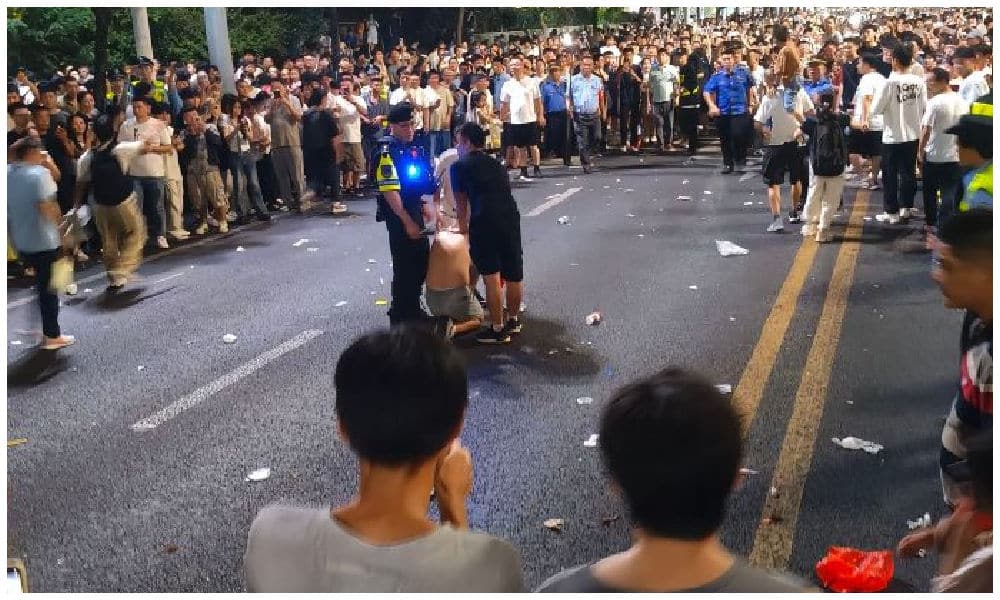
On the evening of October 1st, National Day and the start of a week-long holiday, Nanchang was celebrating with a spectacular fireworks/drone show, drawing an enormous crowd of people (see video).
But the fireworks weren’t the only thing drawing attention. One man on Nanchang’s crowded Shimao Road caught bystanders’ eyes.
He was shirtless, strongly built with a visible tattoo, and was waving a pointed object while loudly shouting something that sounded like, “I’ll kill you! I’ll kill you!”
At first, the people around him seemed unsure of what to do, keeping their distance and too afraid to approach. A large crowd formed but stayed back.
Then, a brave young man in red rushed forward and snatched the pointed object from his hand, while another young man leapt in with a flying kick that knocked him to the ground.
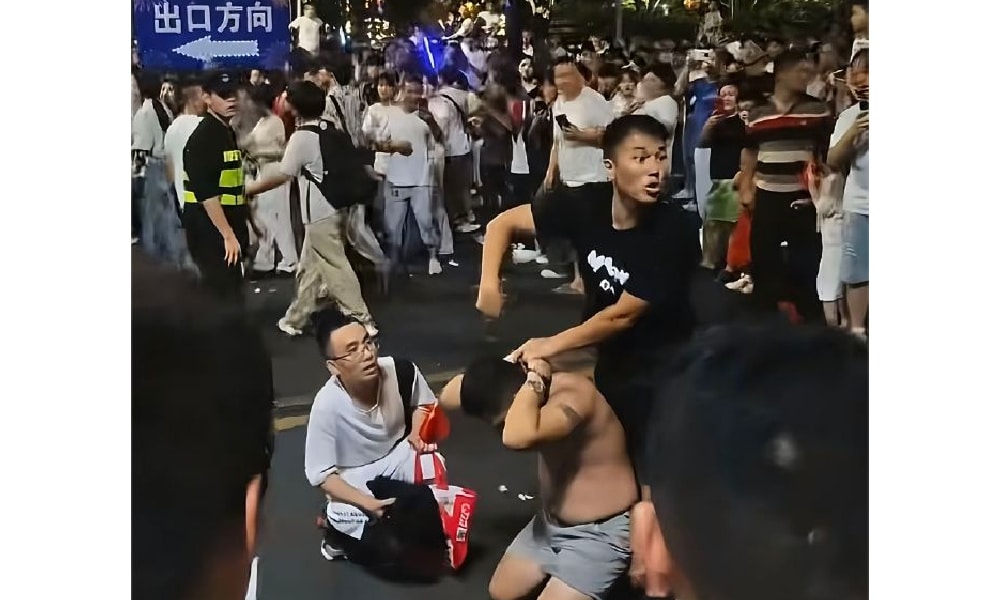
Several others then joined in, working together to restrain the man, as onlookers surrounded the scene and held him there until police arrived and took him to the station.
Soon, videos of the incident spread online (see video here), and rumors quickly surfaced that the man had been trying to attack people with a knife.

But that all turned out to be one major misunderstanding.
The next day, local police clarified what had actually happened, followed by an explanation from the man himself.
The man in question, a 31-year-old local second-hand car dealer named Li, had come to see the fireworks together with his family, including his sisters and three nephews.
Because of the very hot weather, he had taken off his shirt and was cooling himself with a 10-yuan folding fan he had just bought along the way.
After the show, while walking back, Li realized one of his nephews was missing and searched for him, calling out in his local dialect: “Where’s my kid? Where’s my kid?” (“我崽尼 我崽尼” wǒ zǎi ní).
Bystanders misheard this as “我宰你 我宰你” (wǒ zǎi nǐ, wǒ zǎi nǐ, “I’ll kill you, I’ll kill you”) and mistook his folding fan for a machete.
Meanwhile, Li couldn’t understand why people around him were avoiding him and keeping their distance from him while he was searching for his nephew (see that moment here, also see more footage here). People were watching him, and recording the scene from a distance.
Before Li realized what was happening, the fan was snatched from his hands and he was violently kicked. A crowd swarmed him, beat him, and pushed him to the ground.
The police then detained him, and it wasn’t until the early hours of October 2, after thorough questioning, that he was finally released.
“I’m still confused about it,” Li said the next day. Holding the fan up to the camera, he asked: “Can a fan like this really scare people? I don’t understand — I just got beaten for nothing.”
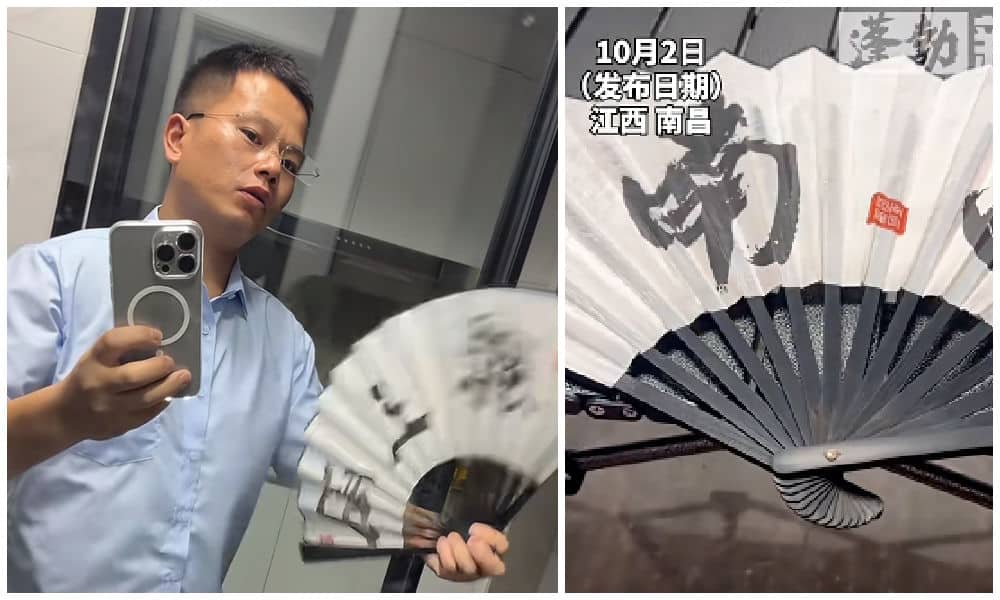
Mr Li in his video, showing the fan he bought for 10RMB/$1.4 at the Nanchang fireworks.
Some commenters remarked that out of the 1.2 million people who were out in Nanchang that night, he was the only one injured.
Li seems to be doing ok apart from a sore backside and a puzzled mind, and his nephew apparently is also safe and well.
The bizarre misunderstanding has sparked widespread banter online, with people now referring to Li as “Nanchang Brother Fan” (南昌扇子哥).
“I’m dying of laughter. It’s both tragic and hilarious,” one Douyin user wrote, while others simply called the situation “so drama” (抓马 zhuāmǎ): “I’m not supposed to laugh, but I can’t help it.”
Some also noted that they understood why people at the scene mistook Li for a criminal: “At night, a guy with tattoos, holding a long stick-like object, shouting loudly all the way, what would you think?”
All joking aside, the public’s response on such a crowded night — when so many people gathered together, potentially making a tempting target for those with bad intentions — shows a heightened sense of vigilance. Unlike the U.S., where gun violence is more common, shootings are rare in China. But random stabbings have increasingly made headlines.
For Nanchang in particular, a stabbing incident that shocked the nation had taken place only weeks earlier: a 19-year-old woman was attacked and stabbed more than ten times by a 23-year-old man she did not know, and later died from her injuries.
But there have also been other recent cases, from Wuhan to Leiyang. And in 2024 especially, a spate of stabbing incidents shocked the country. In Wuxi, Jiangsu Province, a mass stabbing left eight people dead and 17 others injured.
The positive takeaway from this entire mix-up is that the quick action of the crowd — despite their wrong assessment of the situation — shows that people weren’t afraid to step in for the sake of public safety.
But others claim the exact opposite is true. Illustrator and commentator ‘Wu Zhiru’ (吴之如), former editor at Zhenjiang Daily, saw the incident as an example of toxic herd mentality. He posted an illustration of a fan being held up with the characters 清风徐来 (qīng fēng xú lái, “a cool breeze slowly blows”), an idiom to describe a pleasant atmosphere. A finger from the right points at the fan-holder, saying “Look, he’s gonna commit violence!” (“哇,他要行凶啦!”)

Wu Zhiru warns against panic-driven mob mentality and wonders why the first man, who snatched the “knife” from Li’s hands, did not stop the crowd from attacking Li as soon as he discovered that he had snatched away a fan and not a blade. Drawing historical parallels to the Cultural Revolution, Wu argues that people are sometimes so set on doing the “heroic” thing that they hesitate to correct misunderstandings once better information is available — a mindset that can lead to serious, harmful consequences.
For Li himself, despite the unfortunate night he had, the situation has actually brought him some unexpected fame and extra attention for his second-hand car dealership, which undoubtedly makes his boss happy (in a very recent livestream, Li was praised for being kind and loyal).
Many netizens also argued that the real lesson to draw from this ordeal is the importance of speaking proper standard Chinese. Some even framed the incident as “The Importance of Mandarin” (论普通话的重要性), pointing out that the whole problem began because Li was misunderstood while speaking dialect.
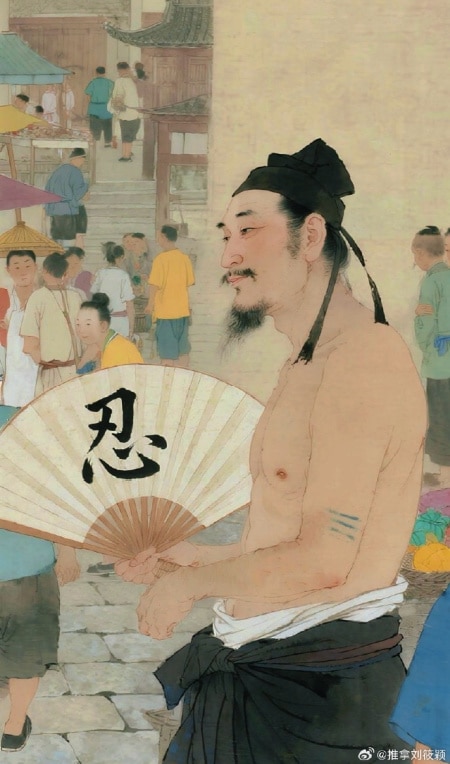
Image posted on Weibo in support of the “fan-waving brother.” The character on the fan says “tolerate.”
Others joked that the misunderstanding was just a grave injustice to shirtless men everywhere, writing: “From now on, the world has one less sincere guy who goes shirtless in the streets. He’ll never be the same again.”
By Manya Koetse
(follow on X, LinkedIn, or Instagram)
Spotted a mistake or want to add something? Please let us know in comments below or email us. First-time commenters, please be patient – we will have to manually approve your comment before it appears.
©2025 Whatsonweibo. All rights reserved. Do not reproduce our content without permission – you can contact us at info@whatsonweibo.com.
China Memes & Viral
China’s National Day Holiday Hit: Jingdezhen’s “Chicken Chop Bro”
From viral street food vendors to China’s donkey crisis and new eldercare services, here’s this week’s Weibo highlights in What’s on Weibo’s China Trend Watch.
Published
2 months agoon
September 30, 2025
🔥 What’s Trending in China This Week? Stay updated with China Trend Watch by What’s on Weibo — your quick overview of what’s trending on Weibo and across other Chinese social media, curated by Manya Koetse.
What’s inside:
- 1. Jingdezhen’s “Chicken Chop Bro” Becomes Nationwide Meme
- 2. China’s 2025 Golden Week Travel Trends
- 3. China Faces Donkey Shortage Crisis
- 4. Word of the Week: “Ride-hailing for Relatives” 亲属打车 Qīnshǔ Dǎchē
- 5. What’s Inside at a Glance
1. Jingdezhen’s “Chicken Chop Bro” Becomes Nationwide Meme
From Beijing to Zibo, every now and then, food stall vendors go viral — for their charm, their uniqueness, and most of all, their tasty food. The star of this moment is 48-year-old Li Junyong (李俊永), who runs a small fried chicken stall in Jingdezhen, Jiangxi Province, with tight rules on who he serves, when, and how.
Li has suddenly become one of the most trending people on Chinese social media under the nickname “Chicken Chop Brother” (鸡排哥 jīpáigē).
Li initially gained popularity among customers for his frantic, multitasking energy — he doesn’t mess around when it comes to his chicken chop business, with superspeed and a clear order of serving customers (“I’ll first do you, then finish yours, then I’ll serve you 做完你的做你的”) and rules such as: no individual customers after 4:30 PM; students pay 1 yuan (about $0.15) less than regular passersby (after 12:00 PM, however, it costs 1 yuan more as punishment for being indecisive); and customers must open the plastic bag themselves before he puts the hot chicken cutlet inside.
The serious way he goes about dealing with his chicken chops almost makes you think he was making big business deals instead of selling to middle school students. In the end, it’s that attitude that gained him social media fame, as students started referring to him as “Head of Chicken Cutlet Operations” (free translation for 鸡排主理人 Jīpái gē Zhǔlǐrén).
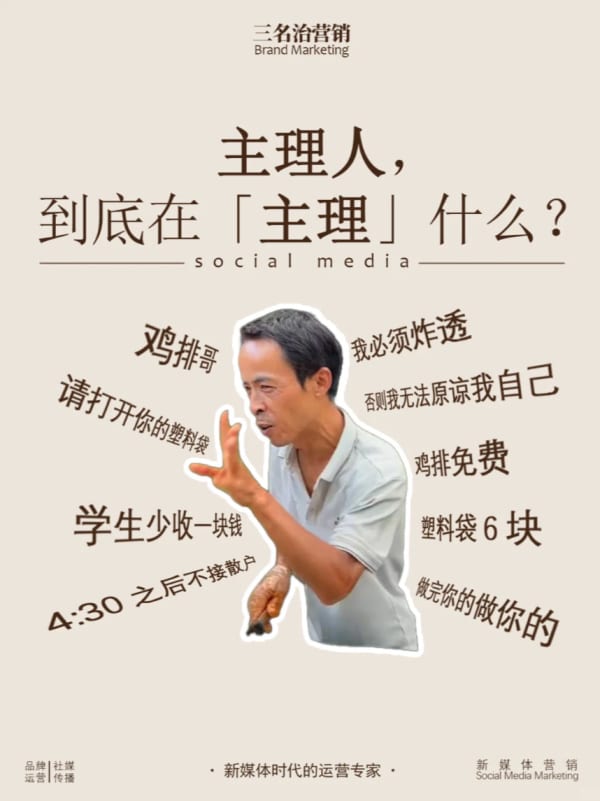
Head of Chicken Chop Operations: “Please open your plastic bag”, “No individual customers after 4:30 PM”, etc.
In light of Li’s explosive popularity, his chicken chop stall now sees extremely long queues, and local authorities and city management have had to intervene in order to control the crowds and keep the location safe.
There are definite downsides to such sudden fame, and Li is not the first street vendor this has happened to.
In 2023, for example, Beijing’s ‘Auntie Goose Legs’ (鹅腿阿姨) went viral, and the food stall owner became so overwhelmed that she temporarily had to take a break from her food stall, emotionally sharing how she said she felt too much pressure because of how the situation was unfolding, and that she just wanted to sell her goose legs in peace (“只想平平安安做烧烤”).
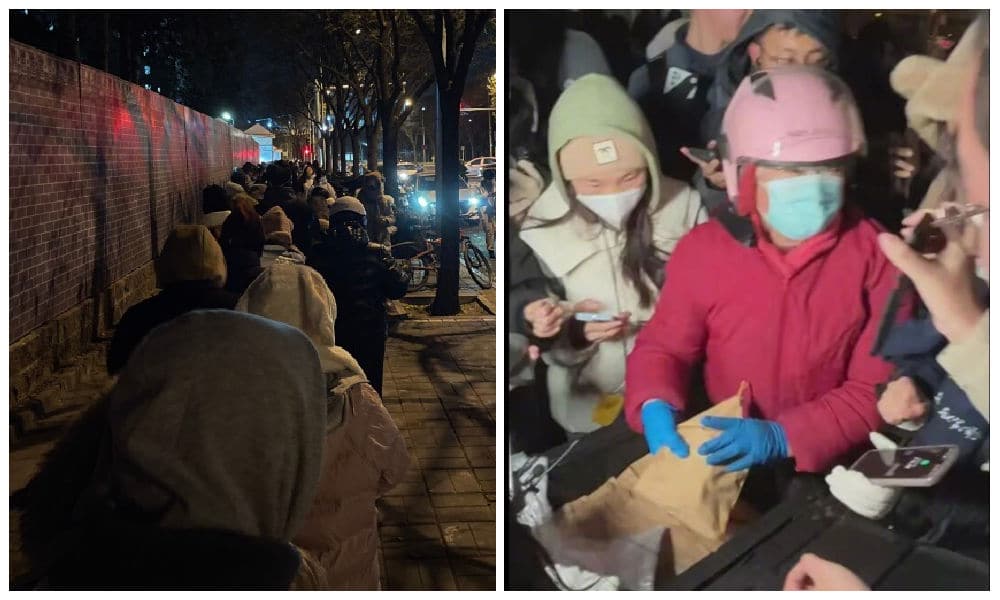
Long lines for Auntie’s goose legs.
It seems that “Brother Chicken Chops”, in line with his reputation as the chicken chop CEO, is trying to turn his viral moment into a sustainable business. According to Sina News, Li has drawn in relatives to help him. He reportedly has taught them how to make and sell his tasty fried chicken chops, and now his Chicken Chop Family (“鸡排家族”) has grown to a total of nine stalls.
Over the past week, Li has also joined several social media platforms, including Xiaohongshu, to build a social following that will last after the hype calms down.
Meanwhile, Li is the meme of the moment. As many Chinese workers experience working stress before the National Day holiday, they’ve used his superspeed working style videos to express the pressure they feel to finish all their deadlines. See videos here.
— What Else Is Trending —
2. China’s 2025 Golden Week Travel Trends

China’s longest holiday of 2025 is coming up, combining National Day (国庆节) and Mid-Autumn Festival (中秋节) into an eight-day Golden Week from October 1–8. If you’re traveling in China this week, good luck — the country’s transportation infrastructure is being pushed to its operational limits.
On September 30, the first “smart people” who opted to leave early to avoid traffic jams already found themselves stuck in them. China’s Ministry of Transport estimates a staggering 2.36 billion trips will be made during this period, with October 1 expected to see over 340 million travelers — surpassing the historical peak of 339 million recorded during Spring Festival earlier this year.
🔸 This week is going to see a lot of events. According to the Ministry of Culture & Tourism, more than 12,000 cultural activities will be held across China during the eight-day holiday period, including over 300 large-scale light shows.
🔸 Chinese local tourism offices are going all in on city marketing and are finding new strategies to make themselves more appealing to young travelers. Chengdu, for example, as Tencent’s gaming hub, is integrating the 10th anniversary of the super popular mobile game Honor of Kings (王者荣耀, Wángzhě Róngyào) into its cultural tourism strategy this year, organizing game-themed city walks, exhibitions, and more.
🔸 China’s travel platform Trip.com reported that interprovincial travel bookings have surged 45% year-on-year, with particularly strong interest in remote destinations like Xinjiang, Tibet, and Inner Mongolia. Searches for hotels in these regions jumped 60% compared to last year. This reflects a shift among middle-class Chinese tourists toward experiential travel and natural landscapes rather than crowded urban attractions.
🔸 The holidays are a time for relaxation, reunions, and eating mooncakes, but it’s also a stressful time for Chinese employers who must comply with labor regulations while managing workforce availability and overtime obligations. Under China’s Labor Law, employees working on statutory public holidays—October 1–3 and October 6 (the official Mid-Autumn Festival date)—must receive at least 300% of their normal daily wage. For adjusted rest days (October 4–5 and October 7–8), employers must provide either 200% overtime pay or compensatory time off. The State Council designated September 28 (Sunday) and October 11 (Saturday) as make-up workdays, but private companies have flexibility to adjust their own schedules.
3. China Faces Unprecedented Donkey Shortage Crisis

China is facing a serious donkey shortage. China’s donkey population is far below market demand, and the prices of donkey-related products continue to rise. The Donkey Branch of China’s Livestock Association (中国畜牧业协会驴业分会) addressed this issue in Chinese media earlier last week, telling China News Weekly (中国新闻周刊): “We have plenty of cattle and horses in China now — just not enough donkeys” (“目前我国牛马都不缺,就缺驴”).
4. “Ride-hailing for Relatives” 亲属打车 Qīnshǔ Dǎchē

Tencent has rolled out a new function via WeChat Mini Programs on September 26, aimed at helping seniors who struggle with app-based ride-hailing. Thanks to the new function, now live nationwide, users can order rides on behalf of older relatives directly in WeChat.
Adult children who want to help out their less tech-savvy (grand)parents or other senior relatives can now bind their account to their own, remotely pre-set pickup and drop-off locations, as well as payment methods, and track their journey for safety.
What makes this different from the possibility of just ordering a ride for someone else is that the seniors stay in control to some extent and can see their own journeys on their own phones. Children can configure settings on their side, while the interface for the elderly users is simplified. This allows seniors to ride independently, with a little help from their family.
The move is part of a broader effort in China to make it easier for seniors to stay involved in the digitalization of society.
The word to know is 亲属打车 qīnshǔ dǎchē, consisting of “亲属” qīnshǔ (relatives) and ride-hailing 打车 dǎchē.
5. What’s Trending at a Glance
- ✈️ The 27-year-old Sichuan creator “Tang Feiji” (唐飞机) died in a plane crash while livestreaming on Sept 27. The ultralight aircraft, piloted and purchased by Tang himself, went out of control and crashed before catching fire. Over 1,000 viewers were watching live, with the chat flooded by messages pleading for someone to rescue him. Local village officials confirmed his death. The tragedy is fueling debate over amateur aviation and extreme content creation.
- 🟢 Weibo has rolled out a visible “online status” feature on personal pages, showing when users are online, and not everyone is happy with it. The new feature is met with criticism from concerned users who don’t want others to see they’re online. It brings back memories of China’s legendary IM app QQ, which, like MSN, showed the online status of users.
- 🥿 A Chinese Marriott hotel location in Changzhou has come under scrutiny adn triggered hygiene concerns after guests found out that the in-room hotel slippers were being reused. The hotel has admitted to disinfected the disposable slippers and reusing them 2–3 times, without disclosing this to guests in advance.
- ⚖️ China’s cyberspace authorities issued stern warnings and announced penalties on various Chinese social platforms recently, including Xiaohongshu, Weibo, and Kuaishou, which are blamed for not keeping celebrity gossip and low-quality content in check and for influencing their hot search rankings. This is all about algorithm governance and the tightrope platforms walk in serving readers, attracting attention, and satisfying regulators.
- 👵 “Outsourced Children” services for Chinese seniors went trending recently. In Dalian, an initiative offering companionship and mediation services for seniors charges 500–2,500 yuan ($70–$350) per visit and has apparently been quite a success, underscoring strong market demand of eldercare-related services and new opportunities for Chinese students.
By Manya Koetse
(follow on X, LinkedIn, or Instagram)
Spotted a mistake or want to add something? Please let us know in comments below or email us. First-time commenters, please be patient – we will have to manually approve your comment before it appears.
©2025 Whatsonweibo. All rights reserved. Do not reproduce our content without permission – you can contact us at info@whatsonweibo.com.
Subscribe
Eye on Digital China is a reader-supported publication by
Manya Koetse (@manyapan) and powered by What’s on Weibo.
It offers independent analysis of China’s online culture, media, and social trends.
To receive the newsletter and support this work, consider
becoming a paid subscriber.

Get in touch
Have a tip, story lead, or book recommendation? Interested in contributing? For ideas, suggestions, or just a quick hello, reach out here.

Signals: Hasan Piker’s China Trip & the Unexpected Journey of a Chinese School Uniform to Angola

About Eye on Digital China — Powered by What’s on Weibo

China Trend Watch: Japan Tensions, Nexperia Fallout, Yunnan’s ‘Wild Child,’ & “Modern Opium”

Eye on Digital China: How Chinese Social Media Evolved from the Blog Era to the AI-driven Age

Trump and Takaichi: The Unexpected Love Affair

The Wong Kar-wai Scandal Explained: The Dark Side of ‘Blossoms Shanghai’

From Schadenfreude to Sympathy: Chinese Online Reactions to Charlie Kirk Shooting

From Nobel Farewell to ‘VIP Toilets’: What’s Trending in China

From Tents to ‘Tangping Travel”: New Travel Trends among Young Chinese

China’s “Post Parade Afterglow”: 6 Social Media Trends
Popular Reads
-

 China Memes & Viral4 months ago
China Memes & Viral4 months agoHidden Cameras and Taboo Topics: The Many Layers of the “Nanjing Sister Hong” Scandal
-

 China Insight7 months ago
China Insight7 months agoUnderstanding the Dr. Xiao Medical Scandal
-

 China Memes & Viral11 months ago
China Memes & Viral11 months agoOur Picks: Top 10 Chinese Buzzwords and Phrases of 2024 Explained
-

 China Digital10 months ago
China Digital10 months ago“Dear Li Hua”: The TikTok/Xiaohongshu Honeymoon Explained



